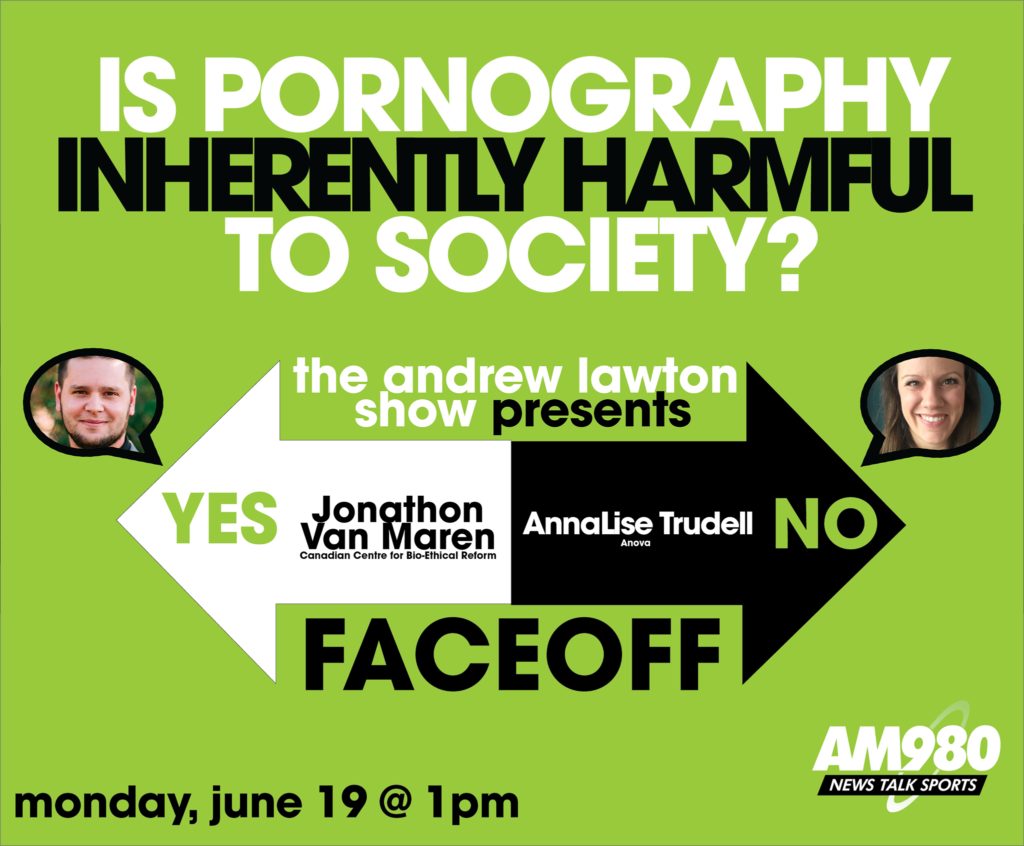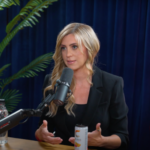By Jonathon Van Maren
On Monday, I joined Dr. Annalise Trudell of Anova on the Andrew Lawton Show to debate the question: “Is pornography inherently harmful to society?” Dr. Trudell, who lists her research interests as gender issues, youth engagement, feminist poststructuralism, feminist praxis in community, and queer issues, was planning to make a single point in response to the debate question: There is good porn, and there is bad porn.
I’d encourage anyone who is interested to listen to the debate, but I just wanted to make a few interesting points about our exchange.
First of all, Dr. Trudell admitted right off the bat that most of mainstream porn is ugly and violent, and that this material contributes to negative and violent attitudes towards sexuality. She even pointed out that she has worked with girls who have been victims of porn-inspired sexual assaults. While a handful of porn scholars desperately try to insist that the tidal wave of sexually violent material swamping high schools and university campuses is having no negative impact, even the debater arguing that pornography isn’t inherently harmful to society was willing to admit that the vast majority of pornography actually is. As Dr. John Foubert has pointed out, with over fifty studies connection porn and sexual violence, the statistical chance that the connection does not exist is one in 88 decillion.
Dr. Trudell hung her case on the word “inherently”—pornography was harmful to society overall, she agreed, but it wasn’t inherently harmful. In response to that, I highlighted peer-reviewed research that used MRIs to scan men’s brains while they looked at porn, showing that the part of the brain that interpreted pornographic images was the part that interpreted objects, not people. Surely material that objectifies and dehumanizes other people for the consumer and turns them into products can be considered inherently harmful—unless we’re willing to say that objectification and dehumanization aren’t inherently harmful.
The difficulty with the debate was that Dr. Trudell wanted to have an ideological argument—she consistently took time to assure listeners that they should not feel “shamed”—and defend the types of porn that she prefers as well as porn she considers “ethical.” Several times, she said that she didn’t want to discuss the research or scientific grounding, and actually cited an article in a lit review to defend one of her positions. At many points it was not so much as a debate as the assertion of scientific evidence and research, and then Dr. Trudell responding by simply saying she thought some porn was helpful, anyway. Anyone judging the debate on the presentation of scientific research versus ideological preference, I think, would have to come down on the anti-porn side of the argument.
During my research for the debate, I noticed that Dr. Trudell had been involved in the Feminist Porn Awards. I mentioned that during the debate to make a point that I think many people may have missed: quite a number of the films entered as “feminist” have women suspended, restrained, chained, or strapped to boards while men aggressively abuse them. Dr. Gail Dines, a radical feminist and the author of Pornland: How Porn Has Hijacked Our Sexuality, responded bluntly to the Feminist Porn Awards a couple of years ago: “Anyone willing to feed off women’s bodies and use them as raw materials to make a profit has no right to call themselves feminists. Even porn without overt violence is a form of exploitation since it reduces women to a series of body parts.”
Dr. Trudell and I had a very pleasant conversation before and after the debate, and I want to highlight how much common ground we were able to find: Gonzo porn, which is the violent porn that has become mainstream over the last ten years, is repulsive and we should find some way of ensuring that young people should not be exposed to it. Additionally, she agreed with me that revenge porn laws are a step in the right direction, and that the vast majority of porn is harmful. I point this out because I saw quite a number of commentors on social media angrily asserting that I would be making religious arguments and crowing that the pro-porn side would win the debate hands down. I do hope they listened, and not only because I suspect that they should find more wholesome things to do with their online time. I hope they listened because they would hear that even someone arguing for the porn side of the debate question is not willing to defend over 80% of the pornography out there in society.
At the end of the day, the debate really boiled down to scientific evidence versus ideological assertion–and assertions completely lacking in evidence. Give it a listen and see what you think for yourself!
________________________________________________
For anyone interested, my book on The Culture War, which analyzes the journey our culture has taken from the way it was to the way it is and examines the Sexual Revolution, hook-up culture, the rise of the porn plague, abortion, commodity culture, euthanasia, and the gay rights movement, is available for sale here.









Excellent work Jonathan, keep up the good work. I notices that Dr. Trudell’s argument was focused on adults watching porn, but she did not give any strong defense of children watching porn and the damaging effect it has on children. Was this issue discussed off air? Was the “useless” recommendations of the M-47 committee study discussed?
No they weren’t, unfortunately.